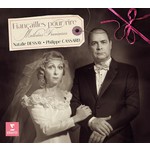
Fiançailles pour rire
 $25.00
Low Stock
add to cart
$25.00
Low Stock
add to cart
CHABRIER / CHAUSSON / DUPARC / FAURE / POULENC
Fiançailles pour rire
Natalie Dessay (soprano), Philippe Cassard (piano)
[ Warner Classics / CD ]
Release Date: Friday 18 September 2015
This item is only available to us via Special Import.
For their second Warner Classics album of French song - a follow-up to the Debussy CD they released in 2011 - soprano Natalie Dessay and pianist Philippe Cassard have adopted the title of Francis Poulenc's song cycle Fiançailles pour rire (A betrothal for fun). Poulenc's compact, charming and touching cycle, composed in 1939 to poems by Louise de Vilmorin, is programmed with some of the best-loved mélodies in the repertoire, such as Fauré's 'Après un rêve', 'Mandoline', and 'En sourdine', Duparc's 'Invitation au voyage' and 'Au pays où se fait la guerre', and Chausson's 'Le temps des lilas' and 'Chanson perpetuelle'.
In 2013, Natalie Dessay announced that she was leaving the opera stage, but since then her inimitable vocal and dramatic talents have been showcased in the music of Michel Legrand - in concerts of his songs (and the Warner Classics CD 'Entre elle et lui') and in a semi-staged version of Les parapluies de Cherbourg (available on a Warner Classics DVD) - and in further live recitals with Philippe Cassard. Describing their partnership, Cassard has said: "I've worked with many singers and this collaboration with Natalie Dessay has given me the privilege and joy of meeting an inspired, but humble artist with a perpetually questing spirit, always ready to question the text and the score." In 2012, he told Le Monde that Dessay captured the style of French art song "with a class and elegance that is not in any way an affectation, but a state of mind that comes perfectly naturally to her." When Cassard originally approached Dessay about performing some rediscovered Debussy songs, the soprano - with her usual candour - expressed some reservations about giving recitals, which are notorious for making singers feel far more exposed than they do in the opera house, where they have costumes, decor, an orchestra and lots of company on stage! But, as she also told Le Monde: "I think I have found the confidence I was looking for ... I have had the pleasure of singing these songs, and of bringing their texts to life, and of presenting them to an audience."
On this new disc she can also enjoy the company of some old friends: in Chausson's 'Chanson perpetuelle' she is joined by the Quatuor Ebène (who welcomed her as a guest artist on their best-selling Fiction album back in 2010) and by the bass-baritone Laurent Naouri - who is, as it happens, her husband. Naouri also duets with her on the final track of the album, Poulenc's haunting 'Colloque', a setting of words by Paul Valéry. "There can be no doubt as to Natalie Dessay's intelligence as an interpreter and her finesse as a musician," wrote the French magazine Diapason when the Debussy album was released, also praising Philippe Cassard for playing that was "warm and eloquent, and not prone to the mistiness of would-be Impressionism or to outbursts of sentiment." "Dessay has a real relationship with Cassard," wrote the American magazine Opera News, "He is the rare pianist, in Debussy's songs or in his piano music, who understands that Debussy wrote genuine contrapuntal lines that are not meant to be negated by washes of pedal." The magic of the Dessay-Cassard partnership was captured by The Telegraph after they gave a recital at Wigmore Hall in London in 2012: "The second half began with Chabrier's hesitantly beautiful 'Chanson pour Jeanne' [also on the new CD] and Chausson's rapturous 'Le temps de lilas'. But the highlight was Dessay's veiled and shimmering account of Duparc's masterpiece 'L'Invitation au voyage', in which her vision of Baudelaire's "luxe, calme et volupté" dissolved into the deep velvet cushioning of Philippe Cassard's wonderfully soft-textured pianism ... Like Shakespeare's Cleopatra, Dessay makes hungry where most she satisfies. Her singing never moves straight forward; it avoids the obvious, the clear-cut, it treats words as if they were paint. And in her throat, these mélodies remain a mystery, a realm in which shadow counts for more than light."
Tracks:
Gabriel Fauré (1845-1924)
1. Après un rêve Op. 7 No.1
2. En sourdine Op. 58 No.2
3. Mandoline Op. 58 No.1
4. Clair de lune Op. 46 No.
5. Prison Op. 83 No.1
6. Spleen Op. 51 No.3
Emmanuel Chabrier (1841-1894)
7. Chanson pour Jeanne
Francis Poulenc (1899-1963)
8. Fiançailles I. La Dame d'André
9. Fiançailles II. Dans l'herbe
10. Fiançailles III. Il vole
11. Fiançailles IV. Mon cadavre est doux....
12. Fiançailles V. Violon
13. Fiançailles VI. Fleurs
14. Colloque (with Laurent Naouri, baritone)
15. Trois Poèmes de Vilmorin I. Le Garçon de Liège
16. Trois Poèmes de Vilmorin II. Au delà
17. Trois Poèmes de Vilmorin III. Aux officiers de la garde blanche
Ernest Chausson (1855- 1899)
18. Chanson perpétuelle Op. 37
(with Laurent Naouri, baritone and Quatuor Ebène)
19. Le Colibri Op. 2 No.7
20. Le temps des Lilas
Henri Duparc (1848- 1933)
21. Au pays où se fait la guerre
22. Soupir
23. Extase